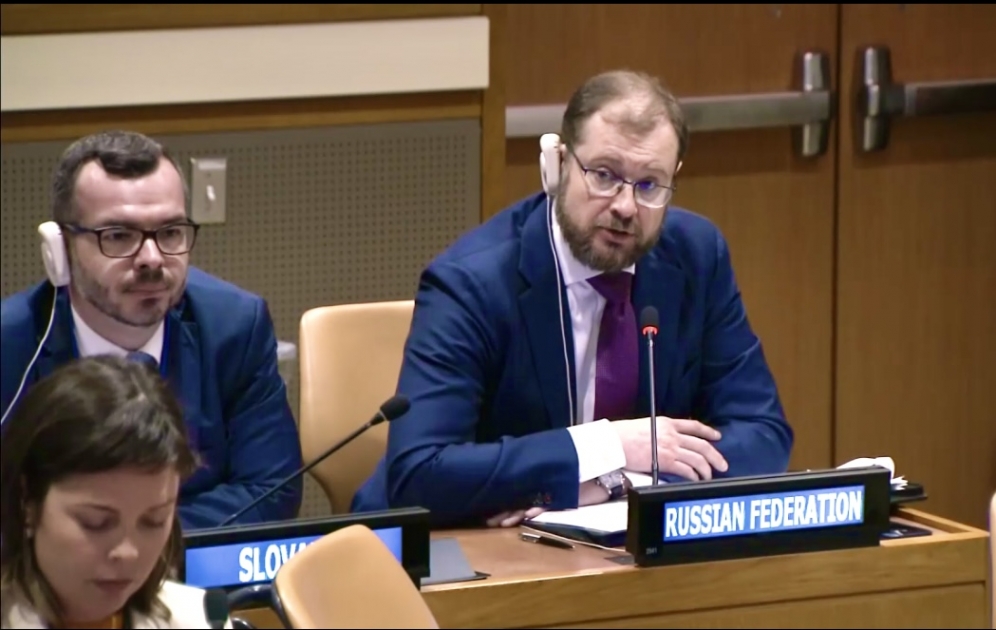Statement by Deputy Permanent Representative Dmitry Chumakov at the round table policy dialogue “Addressing global acute food insecurity and famine risk; what more can policy makers in New York do?”
Thank you very much, Ms. Fillion,
I want to thank the organizers for inviting us for fair and sincere talk. I think that is the best first step of seeking solutions also in New York. And I also thank you for inviting us in particular, because we do have discrepancies with some delegations in this room. But I think we should discuss our discrepancies. That is one and first key issue. I will share a couple of generic comments and a couple of country-specific comments following what was mentioned here in the room.
On generic I would like to say that the big issue is monitoring. Speaking about New York I think that, yes, we do have discrepancies, for example about sanctions and that topics, what are the real causes. And when we disagree, I think, the best way to go is to have UN deliver better monitoring of what actually is happening on the ground and provide this information to us, so that we can make judgements. Because we do alongside of what was mentioned by G77, we do support the idea that unilateral measures they do have big role in igniting this food crises of today.
Monitoring also on how the money are spent. We hear and we of course welcome together with recipient countries huge figures of dollars, of euros which are declared, announced, given, but we can’t understand why on the part of recipient countries there is only cry for more help despite of these huge figures. I think that is also a very important issue to discuss fairly in the Second Committee, in other fora how this donor assistance is actually delivered, what is actually happening and where these projects or programs are effective and where not.
Third generic issue is that, I would also support the idea that we do have to talk about humanitarian and development nexus. But unfortunately, there are countries that are entitled for this nexus and there are countries that are not entitled for this nexus. And here one of the examples is Syria, where we discuss that we need to invest more in agriculture, in development and we still have a lot of discrepancies. I think if we agree that nexus is important, then it should be applicable to all the countries. And absolutely right that we need to focus more on investing in agriculture in recipient countries and that would boost good effect in all the other spheres also, basically eliminating and preventing further conflicts.
I would like also to switch to country specific topic which was mentioned here. I think it would be wrong if I don’t touch upon Black Sea Initiative and Memorandum between Russia and the UN on exporting Russian food and fertilizers. Yes, there are of course a lot of emotions and comments about this package deal. We underline that we see these two initiatives as a package deal, we extended it for sixty days because we see a very big lack and failure in terms of the other part of the package, of Memorandum with Russia. There are systemic issues that are not addressed, you all know that very well. They concern banking limitations, they concern insurance limitations, transportation, vessels and so on. That’s why our producers are trying to do their best. We repeat to everyone that we are responsible one of the world’s major food exporters and fertilizers exporters and we will do all we can to continue all our obligations but still there are a lot of impediments on the way. And one of the examples, is that we announced donation of almost 300 000 tons of fertilizers and more than half a year have passed and only one portion was sent to Malawi – 20 000 tons. That’s very unfortunate, but that is really showing what is actually happening.
And of course, our principled position about the extension is that we need progress on both tracks of this package deal, including solving the systemic issues that I mentioned, because it requires political decisions in Brussels, Washington, London. And there is only one way that these political decisions will have to be made.
Basically, this conversation has a chance to be a uniting conversation. I also welcome all efforts of doing this and we will continue to actively engage in this.
I want to also thank Reena Ghelani and colleagues from Switzerland who mentioned both part of the package. I think that is one of the important steps to touch this particular subject.
Thank you for your attention.
